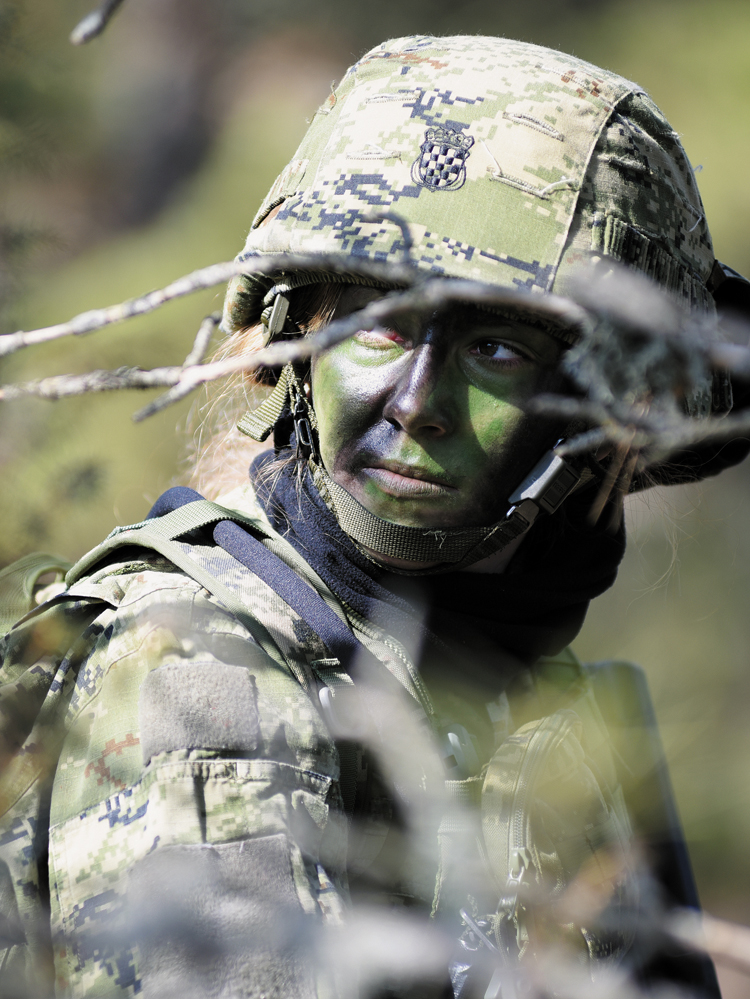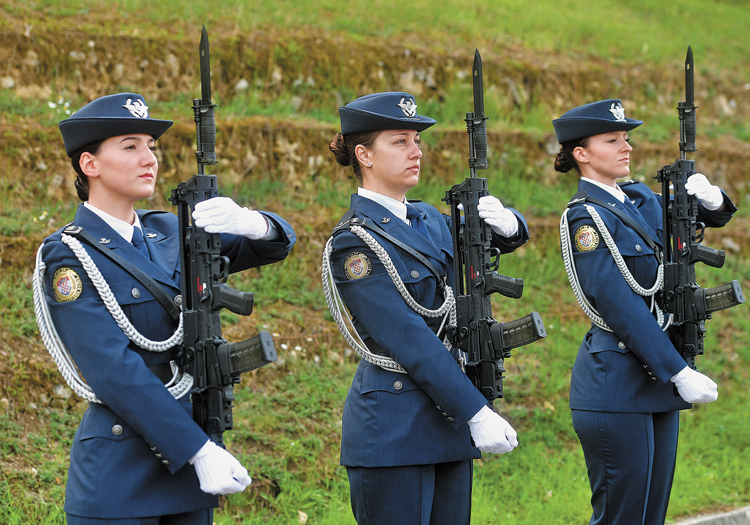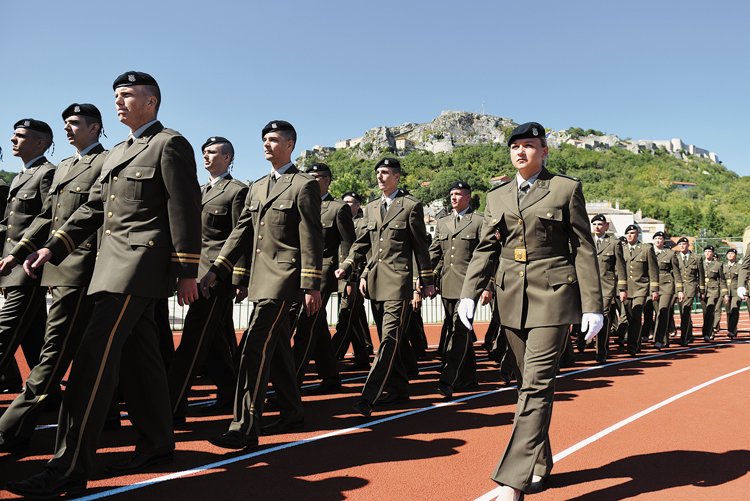The central marking of the Croatian Army and the Croatian Armed Forces Day and…
Enhancing the role of women in the Armed Forces
The Croatian Armed Forces promote the principles of equal opportunities, and each occurrence of gender-based violence and disparagement is strictly prohibited. While proportion of women in the defence sector is higher than NATO countries average, they are less represented at command positions. A prospective one-year project titled “Enhancing the role and support to women in Armed Forces and in peacekeeping missions” aims to enhance the role and position of women in the military sector.
Gender equality, zero tolerance for any forms of gender-based violence and of disparagement is a priority for the Croatian Armed Forces, and any behaviour involving gender-based violence or exploitation within the Armed Forces is strictly prohibited. The Croatian Armed Forces actively support the United Nations Security Council Resolution 1325 on Women, Peace and Security and related resolutions at all levels. A project incepted to enhance the role and position of women in the defence sector is certainly the project “Enhancing the role and support to women in the Armed Forces and in peacekeeping missions”.
It is a project managed by the State Secretary of the Ministry of the Interior, Ph. D. Irena Petrijevčanin Vuksanović and the Deputy Prime Minister and Minister of the Interior Davor Božinović, and funded by the U.S. Government. The project is expected to provide initial analytical insight into the position of women in the armed forces and in peacekeeping missions, as well as facilitate the introduction of gender balance in the activities of the security and defence system, as well as in post-conflict protection and recovery.
Providing benefit for the system
”The project is a result of my study and co-operation with the U.S. Embassy to Croatia, particularly with Ambassador Kohorst. I am an alumna of the U.S.-European Security Issues Program. An alumni and co-manager of the Program is Davor Božinović, Deputy Prime Minister and Minister of the Interior”, says State Secretary Petrijevčanin Vuksanović. Another important project partner is Gender Equality Ombudsman Višnja Ljubičić. The projects of the kind need to involve civil society too, in this case the Centre for Education, Counselling and Research (CESI). The Ministry of Defence of the Republic of Croatia is providing the necessary support and is a permanent partner of the project, and the General Staff of the Croatian Armed Forces and Admiral Hranj as the Chief have an important part too.
“The application was demanding given the strict procedure and the U.S. government through the US Embassy to Croatia asked for additional explanations. It makes our success even higher, as our project was selected out of 300 similar projects, they chose us. All in all, it was a complex job that, in addition to our regular work, included additional engagement”, explained State Secretary Petrijevčanin Vuksanović.
The project will last for a year, and will involve various analyses and usual project methods and activities and education, and the plan is to include the Croatian Defence Academy “Dr. Franjo Tuđman” too.”
“We expect that upon completion of the project and the analysis and conclusions we will be able to provide specific education for female NCOs and officers in accordance with NATO standards and other regulations, and to see raised awareness and knowledge on certain topics. It is also crucial to articulate the most important findings into concrete guidelines and documents. We shall work little by little. The project is intended to provide benefit for the system”, says State Petrijevčanin Vuksanović.
A positive trend
The project is intended for the education of female members of the Croatian Armed Forces, and for raising the awareness on the related topics, which is all a part of the platform.
”This is not an absolute novelty, and there were steps taken to improve the system. No problem highlighted in the project is a specificity of Croatia or its Armed Forces, other countries have such problems too”,
The figures suggest an increasing trend of women in defence sector.
”Statistics-wise, the ratio of women in the Ministry of Defence and in the Croatian Armed Forces was 17.19 % and the ratio of women active duty officers was 13% respectively, which is a slight increase compared to 2014 (10.40%).
The ratio of female participants in the international (the UN, NATO or the EU-led) missions and operations in 2019 totalled 6.09 % (52 female participants) in 2018, 5.03 % (54 participants), 4.88% in 2017 (36 participants) and 7.32 % (31 participants in 2016) respectively. The ratio of female officers from 2014 increased from 14.69 % to 18.46 % in 2019.
The statistical data revealed a positive trend in the ratio of female soldiers, but their presence at the billets was below their overall presence. The presence of women in the defence sector exceeded 17%, which is a respectable figure among NATO nations (the average in 2018 totalled 11.3 %) the ratio of women at command billets was significantly lower”
”The efforts taken at the department and state level towards more women in the Croatian Armed Forces, police, security services and peace missions have been productive: the ratio of women exercising command and managerial billets in the Ministry of Defence and in the Croatian Armed Forces in 2019 totalled 10.95%, which is an increase compared to 2018 (10.35%) and compared to the years 2017 and 2016 (9.34 and 9.10 %)”, reported State Secretary Petrijevčanin Vuksanović.
The ratio of women at managerial duties in the administrative part of the Ministry of Defence in 2019 was 34.22%, slightly less than in 2018 (36.7%) and at command billets in the Croatian Armed Forces the figure amounted to 9.45 % – a slight increase compared to 2018 (8.58 %) and to 2017 (7.9 %).
”The number of promoted female officers in 2019 amounted 12.27%, which is a decrease compared to 2018, which saw 13.61% women – 18.75 % officers and 9.25 % NCOs. The ratio of female members who received awards or commendations in 2019 was 13.81%”.
International operations and missions
Regarding the participation of women in international missions and operations, additional criteria have been adopted for participation in UN peacekeeping missions in order to increase the representation of women in UN peacekeeping missions.
Admission is expanded to officers of junior rank than the standard, and an option to apply for brief 6-month rotation instead of the standard one-year term if the officer is a mother of a child aged under seven. The education on violence against women and children in the areas of conflict is integrated into the pre-deployment training curriculum for the members of the Croatian Armed Forces.
“Regarding the international peace support missions and operations, I welcome the special criteria that apply to women, and it is for a simple reason: it is harder for women to succeed in traditionally male environment and posts, and they also have to balance work and family, and the absence from the family is particularly stressful for mothers, especially with small children”.
Although figures of the overall representation of women in the defence sector rank above NATO average, the fact is the bearers of senior officer ranks are men. The data prove that by 31 December 2019 the number of general officers among women in the Croatian Armed Forces remained the same as in the previous years.
 The Croatian Armed Forces have only one female officer in a general rank (brigadier general).
The Croatian Armed Forces have only one female officer in a general rank (brigadier general).
Women account for 5.56% full colonel officers (18 women), which is an increase with respect to 2018 (4.73 % – 15 women). In the year 2019 as many as 12 men (and no woman) were appointed heads of sectors of the Ministry of Defence; 40.54 % women were appointed heads of services and one woman as director of one of the four Directorates of the Ministry of Defence. Speaking of gender-based violence, according to last year’s data, no act by a member of the Croatian Armed Forces has been registered, either at home or in international environment.
The project “Enhancing the role and support to women in Armed Forces and in peacekeeping missions” is expected to remove shortcomings within the system and strengthen gender equality, and the project received support from the leading figures within the defence system – the Defence Minister Mario Banožić and the Chief of General Staff of the Croatian Armed Forces Admiral Hranj. The tenet of gender equality had been incorporated into strategic defence policy documents even earlier – e.g. the draft Long-term Development Plan of the Armed Forces 2021-2032 highlighted the importance of women in the military.
“Women have been a solid and equal pillar of the success of the military organisation since the Homeland War. In addition to the high standards of equality already achieved, it is necessary to continue developing a human resources management system that will guarantee equality through encouragement and support to assuming senior level duties, including the duties in international environments”, says the project document.
Defence Minister Mario Banožić
The objective of the project is enhancing gender equality among the enlisted soldiers and cadets and promotion of education aimed at prevention of any gender-based violence. The Government of the Republic of Croatia strongly supports inclusion and participation of women in all segments of the society, the defence system included. Gender equality, equal opportunity for all members is a basic principle of our activities.
Chief of the General Staff of Croatian Armed Forces Admiral Robert Hranj
Awareness and gender equality are fundamental values of the Croatian Armed Forces and is integrated into military education programmes curricula at all levels, which promote the principles of equal opportunity, gender equality and zero tolerance for all forms of harassment and violence. The programmes are taught to all soldiers deployed to international environments and peace missions and operations. The overall ratio of women in the military is increasing each year, though their presence at command duties is still not satisfactory. We are aware of that, and there is still work to do ahead of us but I am certain that the new generations will be in a different situation. Gender awareness is an important quality and it directly affects task implementation and operational efficiency, as well as how the military is perceived by the society.
Brigadier General Gordana Garašić, Head of J5 Directorate of the General Staff
The Croatian Army has participated in peace missions and operations around the world for 20 years already and contributed to the transformation of their security systems, the army and the police. Integration of gender perspective, i.e. meaningful participation of women in the military and in police constitutes an indispensable part of the endeavour, because only equal participation of both genders guarantees a safe society. The Croatian Armed Forces have been successful in this regard as the equal opportunity system is integrated into our daily tasks and a segment of commanders’ responsibility.
Each commander within the Croatian Armed Forces needs to spot the human potential in his domain of responsibility and to offer opportunity to the best regardless of the gender. There is also an increasing of women in the voluntary military service by women, which suggests momentum has been gained for the future leaders.
Although we rank high on NATO’s list of the ratio of women in the Armed Forces, we still need to work to ensure major presence of women at command and managerial positions, as a function of their abilities and knowledge. The project “Enhancing the role and support to women in Armed Forces and in peacekeeping missions” is an activity that brings us closer to that goal.
U.S. Ambassador to Croatia Robert Kohorst
Our team at the Embassy and in the State Department recognised the importance of the project and awarded it the prestigious alumni and innovation funds in support. The United States continues to support balanced and dynamic engagement of women in all sectors of society, the military included. The project will focus on the position of women in the Croatian Armed Forces and in peace operations with the aim of gender equality among soldiers and cadets and promote education with the purpose of preventing any gender-based violence. The United States and the Croatian Armed Forces share these important priorities because our countries strive to grow more efficient as military experts and partners in security.
Captain Nanna Christence Fabricius (Royal Danish Air Force)
Denmark has presently 7.9 % females in the armed forces, and all services invest efforts to increase the percentage. Your project highlights that the armed forces achieve more goals when women are included in decision making. It is evident in training missions, peace missions and management as it changes the culture. The change is important for the armed forces, for the society and for security alike, both at the national and international level.
Brigadier General Sandy Best, Deputy Adjutant General, Minnesota National Guard
I am glad to familiarise with your project focussed on studying the position and increasing the ratio of women in the armed forces, the police and peace missions with Croatian participation. At the same time I am interested in learning about how programmes and policies can better support women at key positions. The U.S. Secretary of Defense has recently tasked us with considering defence policy and processes which can boost diversity, inclusion and equal opportunity for all staff of the Ministry of Defence in short, mid and long terms. In 2021 Minnesota and Croatia will mark the 25th anniversary of partnership. We fully support the programmes that continue building and improving our organisations.
Figures:
The ratio of women in Ministry of Defence and in Croatian Armed Forces: 17.19 %
Ratio of women at command/head posts in Ministry of Defence and in Croatian Armed Forces: 10.95 %
1 Female general officer
Croatian version:


